
research

European

multidisciplinary



CO2GeoNet, in collaboration with the Carbon Capture and Storage Association, the IEA Greenhouse Gas R&D program, and the University of Texas at Austin, organized and manned a booth in the Blue Negotiation Area, for the two weeks of COP22 in Marrakesh, Morocco, from 7 – 18 November 2016.
More info at http://cop22.co2geonet.com
Reduction of GHG emissions to keep the maximum temperature change well below 2o C will require an acceleration of mitigation efforts, as CCS, in all carbon intensive sectors including power and industry. CO2GeoNet has discussed about that in a side event at COP22, together with EERA-CCS, Bellona, GCCSI, and IEAGHG.
More info at http://cop22.co2geonet.com
CCS is a demonstrated technology to achieve deep GHG reductions, which may have relevant development in Africa, onshore and offshore. The conference has outlined steps for CCS pilot project development, as well as new opportunities for technology transfer.
More info at http://cop22.co2geonet.com
In the morning of Thursday 10 November 2016 about 25 people met in a side event at the COP22 in Marrakech discussing the status of CO2 Capture and Storage (CCS) as a climate mitigation measure. The event was organized by CO2GeoNet, Club CO2 and IEA GHG. Aicha El Khamlichi (Club CO2) led the event.
More info at http://cop22.co2geonet.com
CO2GeoNet has contributed to COP 22 by organizing or co-organising three side events in the UNFCCC Negotiation Blue Zone, one side event in the Innovations Green Zone, and one booth in the Blue Zone.
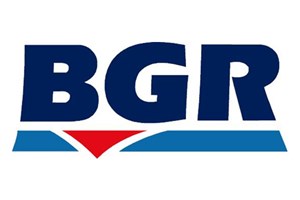
The Federal Institute for Geosciences and Natural Resources (BGR) is the central geoscientific authority in Germany providing neutral and independent information and advice to the German Federal Government, the German parliament, national industry organizations and individual entitites. BGR also represents the Federal Republic of Germany in international geoscientific committees. It is subordinate to the Federal Ministry for Economic Affairs and Energy and has a staff of around 750 people.
BGR is one of the competent authorities in Germany according to the German CCS law and it is committed in international committees with relevance for CCS such as the ISO Technical Committee “Carbon dioxide capture, transportation, and geological storage” (ISO/TC265).
BGR was one of the founding members of CO2GeoNet at the time of the EC contract and is now a cooperating partner of the CO2GeoNet Association as defined by a cooperation agreement.
Since the year 2000, BGR has been investigating various aspects of the geological storage of CO2 in different locations and regions inside and outside Germany, partnered by national and foreign research institutions, geological surveys, and industrial partners. Research activities have focused on the following topics:
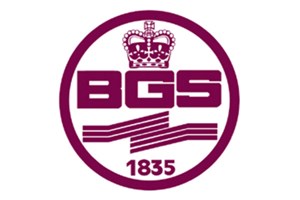
The British Geological Survey
The British Geological Survey (BGS) was established in 1835 and is the United Kingdom’s national geological survey and one of the world’s major centres of geoscientific knowledge, expertise and excellence. It is the UK's premier provider of objective and authoritative geoscientific data, information and knowledge for sustainable use of natural resources, reducing risk and living with the impacts of environmental change. BGS is a public sector organization responsible for advising the UK government on all aspects of geosciences, as well as providing impartial geological advice to industry, the public and academia. BGS is a component institute of the UK Natural Environment Research Council (NERC).
BGS is a world leader in the field of geological storage of CO2. It is the largest storage research centre in the UK with over 30 active researchers and a track record in CCS going back to 1991. Over the past two years BGS has carried out more than 60 CO2 storage projects. Our current annual Carbon dioxide Capture and Storage (CCS) turnover is £1.3M. For more information please see the CO2 storage research pages on our website.
Since coordinating the first EC funded CCS research and development project (Joule 2) BGS has played a major role in CO2 storage research through projects funded by research grants from the European Commission (e.g. FP5, FP6, FP7, EuropeAid), UK funding (e.g. NERC, EPSRC, UKCCSRC), industry and through own funding. BGS has a seat on the Co-ordination Group of the UK CCS Research Centre (UKCCSRC) and provides two UKCCSRC Research Area Champions. BGS is Storage Coordinator for the CCS Joint Programme of the European Energy Research Alliance (EERA) and is a founding partner of the CO2GeoNet Association.
Examples of a few recent projects and roles are given below:
The GeoEnergy Research Centre (GERC) is a pioneering joint venture co-founded by BGS and the University of Nottingham (UoN). As part of this partnership, the GeoEnergy Test Bed has been established, this subsurface field laboratory will be used to assess fluid-rock interaction, sensor development and to support advanced reservoir modelling techniques relating to sustainable energy technologies including CCS.
BGS hosts and develops the UK CO2 Storage Evaluation Database in partnership with The Crown Estate. This database represents a state of the art assessment of storage potential of the offshore UK. Development of the database was funded by the ETI and the Crown Estate.
BGS is a core member of the BIGCCS Centre (Research Council of Norway and industry funding, 2009 – 2017). The goal of the Centre is to enable sustainable power generation from fossil fuels based on cost-effective CCS. The BIGCCS Centre develops new knowledge and technologies required to accelerate deployment of large scale CCS through international cooperation, innovation and value creation.
BGS is responsible for development of the IEAGHG web-based storage site monitoring selection tool which identifies and prioritises technologies that could form part of a monitoring programme (funded by IEAGHG)
BGS lead the DiSECCS project (EPSRC research grant, 2013 – 2017). This project brings together monitoring datasets from the World’s three industrial scale CO2 storage sites at Sleipner, Snohvit and In Salah to develop and test advanced and innovative monitoring tools and methods for the measurement and characterisation of the CO2 storage reservoirs through advanced seismic techniques.
BGS is also partner in a new NERC-funded grant (2016-2020) to assess CO2 migration processes in storage site overburdens; Characterization of major overburden leakage pathways above sub-seafloor CO2 storage reservoirs in the North Sea (CHIMNEY).
The ULTimateCO2 FP7 project (2011 – 2015) focused on the long-term processes involved in the geological storage of CO2 in order to increase confidence in the long-term efficiency and safety of CCS. BGS was Work Package leader responsible for directing research on long-term geochemical reactions in reservoir systems following CO2 injection.
The QICS controlled subsea release project (funded by NERC and the Scottish Government, 2010 – 2014) improved understanding of the sensitivities of the UK marine environment to CO2. The aim of the project was to understand potential impacts if leakage were to occur from a CCS project. BGS was lead partner on drilling and CO2 injection for the project.
The CO2CARE project (funded through EC FP7 and industrial sponsorship, 2011 – 2014) delivered technology and procedures for abandonment and post-closure safety, satisfying the regulatory requirements for transfer of responsibility. BGS coordinated the development of dry-run site closure applications for the Sleipner, Ketzin and K12-B storage sites.
The SiteChar FP 7Project (2011 – 2013) researched development of site characterisation methodologies to satisfy European regulations relating to CO2 storage. BGS coordinated the assessment of dry-run storage licence applications for possible UK and Danish storage sites on behalf of representatives of industry, academia and regulatory bodies.
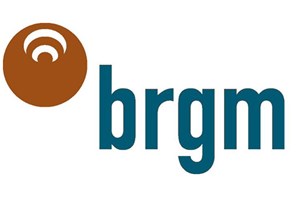
BRGM is France’s Public Institution responsible for mobilising the Earth Sciences in the sustainable management of natural resources and the subsurface domain. It contributes advice and expert assessments to public authorities.
BRGM research and development programmes support innovation and work in the following areas: mineral resources, groundwater, development planning and natural risks, environment and pollution, environmental metrology, mapping and digital information systems. With a staff of 860 employees, BRGM is present in all the Regions of France through its network of Regional Geological Surveys and has been active for many years in more than 40 countries throughout the world.
BRGM is acknowledged within France as a leading authority on CO2 sequestration. BRGM was involved in the pioneer EU Joule project ten years ago and has been involved since in many other CO2 projects: SACS, SACS2, GESTCO, NASCENT, WEYBURN, CO2NET, CO2STORE, SAMCARDS, PICOR. BRGM present expertise in CO2 research concerns: 1) geochemical modelling of CO2-water-rock interactions; 2)coupled geochemical-transport-flow modelling; 3) microseismic monitoring; 4) soil gas survey monitoring; 5) geochemical monitoring; 6) long term risk assessment. BRGM has been leading since the Joule project the Work Packages or tasks on geochemistry or geochemical and coupled modelling and is then acknowledged in Europe as an expert on the geochemical aspects of CO2 storage. BRGM will also bring to the NoE significant expertise from other research domains (e.g. geothermal energy, radioactive waste storage, mineral exploration, natural hazards, contaminated sites) that can be transferred to CO2 storage research, such as geomechanical modelling, geochemical and geomechanical experiments, and a wide range of geophysical and remote sensing monitoring methods. Concerning the other items of the Joint Programme of Activities, BRGM will have a key role in: integrating activities: share of research infrastructure (analytical and experimental facilities, modelling tools, monitoring tools), staff mobility, communication, joint research development; activities to spread excellence: professional training, conferences & workshops, media. BRGM has already experience with professional training, conferences & workshops, media in the field of CO2 research. BRGM is involved in advice to French government regarding CO2 issues by participation in two national committees: MIES (Mission Interministérielle sur l’Effet de Serre, Governmental Committee on Greenhouse Effect) and Club CO2 (French thematic club on CO2 capture and storage).

Czech Geological Survey (CGS / Czech Republic) is the leading geological research institution in the Czech Republic. It is a state research institute supervised by the Ministry of Environment. Its staff counts about 260 people, round 170 of them being university graduates.
Geo-energy related activities of CGS have developed a significant knowledge in the field of CO2 geological storage, monitoring of CO2 and methane migration and emanation at sediment surface, formation water geochemistry, mineralogical, optical and geochemical characterisation of the reservoir rocks and seals. CGS is Czech national country representative in ENeRG (European Network for Research in Geo-Energy) and is in charge of ENeRG website www.energnet.eu. In 2004-2011, CGS was a member of CO2NET, the Carbon Dioxide Knowledge Sharing Network. CGS took part in a series of European R&D projects, incl. the FP6 EU GeoCapacity project (Assessing European Capacity for Geological Storage of Carbon Dioxide) and CGS Europe (FP7 Pan-European Co-ordination Action on CO2 Geological Storage). In 2006-2010, CGS coordinated CO2NET EAST, a FP6 project focused on CCS knowledge transfer and awareness raising in new EU Member States and Candidate Countries.
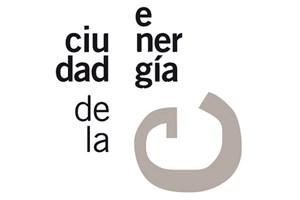
Projects:
- OXY-CFB-300 Compostilla Project (EEPR-funded), technology development;
- FP7: ECCSEL & IMPACTS.
- Other research projects: EM-Hontomín or IMPACT-CO2.
- Knowledge sharing project under preparation with GCCSI.
There are several activities within the above mentioned projects, lab-scale activities related to characterization of samples before & after the experimental injection of impure CO2 streams; the study of bioindicators at the PISCO2 facility, where different & controlled CO2 fluxes are injected in isolated cells filled with soils; testing of injection strategies at an onshore large scale pilot on CO2 Storage in Hontomín, where a set of monitoring techniques will be tested, as well as the methodologies which best apply to that research scope.
Public perception activities are being developed at different locations including the area of Hontomín, where local population, including authorities are engaged with the project, due to a successful and proactive communication plan.

ETH Zurich is one of the leading international universities for technology and the natural sciences. It is well-known for its excellent education, ground-breaking fundamental research and for implementing its results directly into practice. Founded in 1855, ETH Zurich today has more than 18,500 students from over 110 countries, including 4,000 doctoral students. To researchers, it offers an inspiring working environment, to students, a comprehensive education. Twenty-one Nobel Laureates have studied, taught or conducted research at ETH Zurich, underlining the excellent reputation of the university. According to the 2015 QS Rankings by Subject, ETH Zurich's earth scientists performed especially well, achieving the top rank for the subject Earth & Marine Sciences.
Among ETH Zurich’s strategic focus areas are climate change and energy science. In particular, energy research at ETH Zurich is geared towards the aim of enabling the 1-tonne CO2 society. Hence, ETH Zurich has taken the role of the leading house in various national projects dealing with the Carbon Capture and Storage value chain. The project CARMA explored the potential and feasibility of CCS systems deployment in Switzerland, and led to the development of a Swiss CCS roadmap to a CO2 injection test. The storage pilot test got integrated in the ongoing Swiss Competence Centre for Energy Research - Supply of Electricity. Furthermore, ETH Zurich hosts the Swiss Seismological Service with its recognized specialists for injection-induced seismicity. At European level, ETH Zurich is in the core group of ECCSEL, the European Carbon Dioxide Capture and Storage Laboratory Infrastructure project. The goal is to establish and operate a world class network of complementary distributed CCS laboratories and a limited set of pilots and test sites.
Relevant memberships and project experience:

The Geological Survey of Austria belongs to the Ministry of Science and Research, and is acting like a department of the Ministry and therefore is not a separate legal entity.
The main tasks of the institute is the geological mapping of Austria, research in applied geology covering hydrogeology, natural resources, engineering geology, geochemistry, geophysics and geothermal. In addition it runs the biggest geological database and library in Austria. As a national expert pool servicing public institutions as well as the private economy, its tasks are formulated and published by a national law in Austria. This work has been performed continuously since 1849.
Since 2008 the Geological Survey of Austria is a member of the “CO2 Storage task group in Austria” which consists of representatives from federal authorities, universities and the oil-industry. The main objective of this group is to investigate the geoscientific, technical and legal aspects of potential CO2 storage in Austria.
The future role of GBA will be the main advisor of the Ministries in Austria awarding licences for CCS to companies.
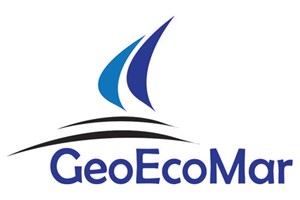
The National Institute of Marine Geology and Geo-ecology of Romania- GeoEcoMar, is a research and development institute established in 1993, under the co-ordination of the Romanian Ministry of Education and Research.
The main activities of GeoEcoMar relate to marine, deltaic and fluvial environmental and geoecological studies regarding the ecosystems of the River Danube - Danube Delta - coastal Black Sea geosystem; the environmental impact of anthropogenic structures (civil and hydrotechnical works) that are located along the Danube course and in the Danube Delta; geological-geophysical-geoecological survey of the Black Sea as well as of other marine areas; study of natural hazards in Black Sea environment (submarine landslides, tsunami, major storms, etc).
In recent years, under the leadership of Dr.eng. Constantin-Stefan Sava, Head of the Geophysical Methods for Deep Investigations Department, the Institute has started studies and analysis connected with the greenhouse emissions in Romania as well as the possibility of geological storage of CO2. Scientists from GeoEcoMar were and are actively participating in FP-6 projects: CASTOR, as subcontractors, EU Geocapacity and CO2 Net East as well as in FENCO-ERA project: Impact of communication. To boost the activity in this field in 2007 a CO2 Club was established.,Scientists from GeoEcoMar have a large experience in disseminating CCS knowledge in Romania, are involved in preparing a local CCS demonstration project by assessing potential storage sites and provide the geological expertise for the implementation of EU Directive on CO2 geological storage in Romania.
National activities/networks: GeoEcoMar is part of the national task force organised at governmental level for the implementation of the EU Directive for CO2 storage and is a founder member of the CO2 Club association.

Geoinzeniring, a SME company is engaged in geological engineering and is one of the leading companies of its kind in Slovenia. It was established in 1998 as a limited liability company. Prior to that, it has a noteworthy tradition, which had started in 1946 with its legal predecessors (1946 – 1954 Geological Institute of Slovenia, 1954 - 1991 Geological Institute Ljubljana, 1991 - 1998 Institute for Geology, Geotechnic and Geophysics).
The company's main activities comprise investigations, project designing and consulting in the areas of soil and rock mechanics, engineering geology and engineering geophysics. The co-ordination of these activities allows the company to provide complete, cost-effective and environment friendly solutions. The modern measuring and laboratory equipment and extensive data bases enable professional staff to perform wide range of services, such as projects for infrastructure and power plants, geological and environmental hazard, water and mineral resources.
Geoinzeniring is Slovenian national country representative in ENeRG (European Network for Research in Geo-Energy). Geoinzeniring has participated in international CCS related projects (CASTOR WP2.1, EU GeoCapacity, dissemination activities of CO2NET EAST, CO2StoP, CGS Europe) and acts as a leading knowledge transfer body in the area of CCS in the country. CO2 storage, monitoring and verification as well as utilisation of the deep subsurface is of our particular interest.
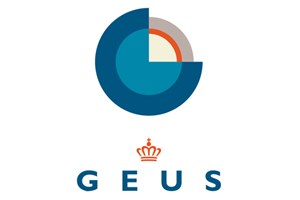
The Geological Survey of Denmark and Greenland (GEUS), established in 1888, is a research and advisory institute under the Danish Ministry for Environment and Energy.
The main mission of GEUS comprises provision of R&D and advisory services for government agencies, local authorities and private enterprises in Denmark as well as internationally. Key scientific areas include: ground water and surface water resources, petroleum resources and subsurface energy storage/disposal, raw materials and minerals resources, geological mapping of Denmark, Greenland and the Faeroe Islands, marine geology, environmental impacts assessment, and physical & electronic data storage for the Kingdom. Current staff is about 450, with some 200 holding academic degrees. Annual turnover is about DKK 225 million (c. 30 million Euro). GEUS has conducted research pertaining to geological sequestration of CO2 since 1993, being one of the European pioneers in this area. GEUS has lead or contributed to a number of RTD projects, including; SACS Phases Zero, 1 and 2, GESTCO (project manager), CO2NET 1 & 2 (initiator and co-ordinator of RTD strategy activity), Weyburn (Canadian CO2 EOR), CCP (sub-project on aquifer storage) and CO2Store (co-ordinator of 4 onshore site-specific activities). In addition, GEUS is actively engaged in a number of international forums including IEA (Greenhouse Gas Programme, Oil and Gas Advisory Group, WPFF Task Force on Zero Emissions), European Commission and Parliament (expert workshops, evaluations, FEE etc.) and the IPCC ongoing activity aiming at gaining acceptance of CO2 capture and storage as a Kyoto Protocol mechanism.
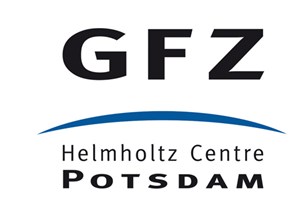
GFZ was founded in 1992 as the national research institution for geosciences in Germany and is ab initio member of the Helmholtz Association of National Research Centres. With currently 1100 staff GFZ combines all solid earth science fields including geodesy, geology, geophysics, mineralogy, palaeontology and geochemistry, in a multidisciplinary scientific and technical environment.
The GFZ is built up by five departments: geodesy and remote sensing, physics of the Earth, geodynamics and geomaterials, chemistry of the Earth, and Earth surface processes. The departments are accompanied by Geo-Engineering Centres, e.g., for tsunami early warning, for geothermal energy research, and underground storage of CO2.
The Centre for Geological Storage CGS is in charge of management and research at the CO2 storage site of Ketzin. There, the storage of a maximum 100,000 t of CO2 is permitted (65,000 tonnes of CO2 already injected by May 2013) and several European and German projects are already integrated, among them CO2SINK and CO2ReMoVe. Their synergy is leading to an exhaustive characterization of the site and has allowed the development and deployment of a rich and innovative monitoring network to observe the plume migration and reservoir behaviour. The Centre for Geological Storage CGS is also active at the international level, as member of the International Performance assessment Centre for CO2-Storage (IPAC) and within the Helmholtz-Alberta Initiative (HAI) with the University of Alberta.
Relevant project experience (most recent only):
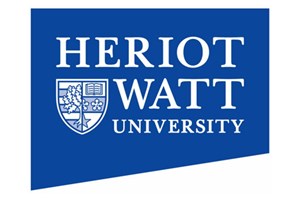
The Institute of Petroleum Engineering at Heriot-Watt University (HWU) is internationally recognised for the quality of teaching and research. In 2015, we celebrated our 40th anniversary, and gained the Queen’s Anniversary Prize in recognition of the pioneering research.
Several research groups are involved in projects related to CO2.
SCCS Research Projects
A number of projects have been carried out as part of SCCS (Scottish Carbon Capture and Storage – www.sccs.org.uk). HWU is a founder member of this group, along with the British Geological Survey and the University of Edinburgh. We have taken part in projects to assess potential storage sites in deep saline formations under the North Sea, and also to evaluate enhanced oil recovery and CO2 storage in hydrocarbon reservoirs. In particular, we specialise in numerical simulation of CO2 injection into realistic reservoir models.
Centre for Enhanced Oil Recovery and CO2 Solutions
This group performs experiments on core plugs and micromodels to investigate oil and gas recovery mechanisms at high pressures and temperatures. They also perform numerical simulations to generalise the results of the research.
PVT and Hydrates
The PVT group studies the effect of impurities on the properties of CO2.
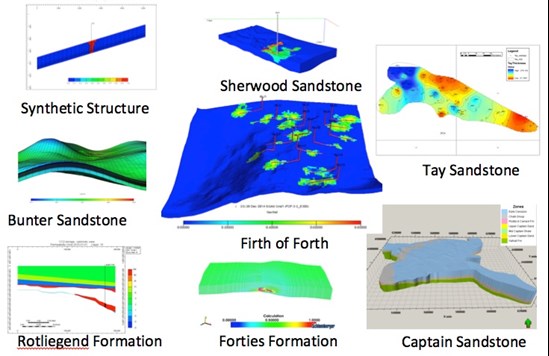
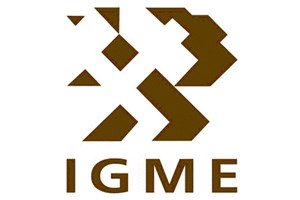
Instituto Geológico y Minero de España- IGME is a public research organism that belongs to the Spanish Ministry of Science and Innovation.
Its goal is to provide support to other administration bodies and to the society in general about all activities related to Earth Sciences. IGME has been a partner of the GeoCapacity Project and it is now Work Package coordinator at the COMET Project, both financed by the Framework Programme.
IGME has also participated in national initiatives related to geological storage, as PSE-CO2 project and CenitCO2. In this project, technicians involved belong to the area of Subsoil and Geological Storages Investigation. IGME is also ivolved in the monitorization programme of the pilot test site of Hontomín, ran by the City of Energy Foundation (CIUDEN).
Fields of Experties
CGS Projects
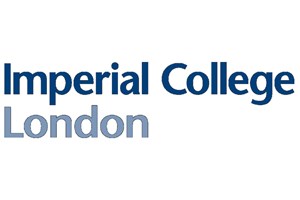
Imperial College is a technological university having a strong international reputation in teaching and research across the main areas of science and technology. The College has around 1750 full-time members of academic and research staff involved in research.
In the latest Higher Education Funding Council Research Assessment Exercise, covering all universities, the Department was accredited with the maximum score of 5* for its international research excellence. Research carried out by the Group at Imperial College since 1990 has established the Group as an internationally recognised multi-disciplinary research centre dealing with coalbed methane and enhanced coalbed methane technology, environmental modelling and risk assessment. A number of projects funded by the UK Research Councils, UK Department of Trade and Industry, the European Commission and industry led to the development of a unique CMB simulator (METSIM) which has recently been extended as an ECBM/CO2 Storage simulator (METSIM2) through the EC Energie Programme funded project ICBM, co-ordinated by IMPERIAL.
Examples of related research projects:
(1) "Numerical simulation of methane flow in coal seams",
(2) "An experimental and theoretical investigation into coalbed methane well performance prediction and stimulation modelling",
(3) "Coalbed methane well stimulation-modelling and performance prediction",
(4) "An investigation into horizontal borehole technology for improved coalbed methane recovery",
(5) “Methane production simulation from abandoned mines (METSIM)”,
(6) “An investigation into the effects of matrix swelling on coal permeability for ECBM and CO2 sequestration assessment",
(7) “Development of advanced reservoir characterisation and simulation tools for improved Coalbed Methane Recovery (ICBM)”,
(8) “Assessment of hazardous gas emissions to the surface over former mined areas (MINGAS)”,
(9) “An experimental investigation into permeability enhancement in coalbed methane reservoirs”,
(10) “Modelling the uncertainty and risks associated with the design and life cycle of CO2 sequestration in coalbed methane reservoirs (ECBM-RISK),
(11) ”ECBM Software Code development/comparison project (Geo-Seq)”,
(12) “CO2, from capture to storage (CASTOR)”,
(13) “CO2 Life Cycle and Impact Assessment in Capture and Geological Storage (CO2LCA).

IRIS - International Research Institute of Stavanger is an independent research institute with research and research-related activities in Energy, Marine Environment, Social Science and Business Development with high focus on applied research. I
RIS was established in 2006 as a continuation of Rogaland Research, (founded 1973), when it became equally owned by the University of Stavanger and the regional foundation Rogalandsforskning.
IRIS - Energy focuses on research and development of new technologies related to safe and environmentally sound exploration and exploitation of oil and gas, sustainable energy, and storage of carbon dioxide. More than 35 years of research and development have given significant contributions to the oil and gas industry, especially within improved oil recovery and cost efficient and safe drilling operations. Verification is performed in full scale at the onshore Ullrig Drilling and Well Centre and in our Petroleum laboratory facilities.
Automated Drilling and Multiphase Reservoir Flow are IRIS Energy's priority areas.
Our capabilities and work functions span from oil field reviews and consulting, to the development of specialized and applied research techniques. Different modelling and reservoir simulations are used in a range of cases from early exploration of hydrocarbon potential, to production optimization, data assimilation using the Ensemble Kalman Filter (EnKF) technique, IOR technologies and flow of hydrocarbons or CO2 in reservoirs. State of the art laboratory facilities provide required parameters, product testing and development supporting our research activities.
Within CCS research projects IRIS are using its experience in

Middle East Technical University Petroleum Research Center (METU PAL) was founded in 1991 with the collaboration of Middle East Technical University Department of Petroleum and Natural Gas Engineering, General Directorate of Petroleum Affairs and Undersecretariat of Treasury. METU PAL is a developed research center that continues fuel quality check analysis and provides national/ international consulting services as well as analytical solutions about petroleum industry and any related energy and environmental issues. Since 1994, METU PAL provides quality check and standard compliance control analysis to the petroleum sector and since 2004 the center has the accreditation provided by Turkish Accrediation Agency (TURKAK) on TS EN ISO IEC 17025 Standard. Analysis of gasoline, diesel oil, fuel oil, natural gas, liquefied petroleum gas (LPG), mineral oil and waste oil quality check are conducted at METU PAL with high technology equipment. With the continuous follow-up of fuel that is transferred from refineries to distribution companies, from fuel stations to the consumers, both consumers and companies are protected. In this context, METU PAL is designated as an umpire laboratory with the February, 15 2001- Number: 24319 issue of The Official Gazette by Undersecretariat of Customs. Center is also conducting researches related to oil/gas and geothermal reservoir evaluations, natural gas and carbon dioxide storage. PAL is involved in international and national projects such as CGS Europe, ENOS as well as some contracted researhes in petroleum and geothermal sector.
Mission of METU PAL:
Main objectives of METU PAL:
Based on its quality policy, METU PAL continues its activities according to national/ international standards with high technology test equipment, participates in inter-laboratory comparison tests and uses reference/ standard materials. METU PAL targets to meet the needs of the sector with its continuously trained professional personnel.
METU PAL has Fuel Analysis Laboratory, Waste Oil Analysis Laboratory, Natural Gas Analysis Laboratory, LPG Analysis Laboratory and Computerized Tomography Laboratory.
Since 2006, METU PAL continues the inter-laboratory comparison scheme LabKar, which was accredited according to ISO/ IEC 17043 on September 23, 2014 by Turkish Accrediation Agency (TURKAK). In the context of inter-laboratory proficiency testing scheme LabKar, participant laboratories receive diesel oil, gasoline, mineral oil, LPG samples twice a year and biodiesel, fuel oil, jet fuel samples once a year. In 2015, 72 laboratories had participated in LabKar and the results of the analysis of 208 parameters for different fuel types were collected, evaluated statistically and reported. By LabKar, it is aimed at that participant laboratories conduct fuel analysis determined by legislators according to standards, evaluate their test results and improve their performance.
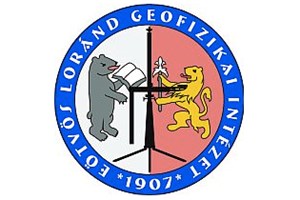
The Geological and Geophysical Institute of Hungary (MFGI), as an independent institution of the Mining and Geological Bureau, is one of Hungary's most significant research centres in the field of geoscience. Its activity includes research both in the pure and applied parts of geophysics as well as geophysical exploration and prospecting.
It embraces the application of seismic methods in investigations spreading from the soil and shallow engineering problems to the deep Earth's crust and upper mantle studies. MFGI applies non-seismic methods, e.g. gravity, magnetic, electrical and electromagnetic including tellurics, magnetotellurics and radar in structural studies, geological mapping, engineering and environmental investigations as well as geological mapping and lab analytics. Geophysical and most of the geological databases of Hungary are also handled by MFGI.
Microseismic monitoring:
1)Deployment and continuous operation of seismotectonic monitoring network in the Mecsek Mountains since 2005;
2) 3D seismic tomography measurements and data processing in the Mecsek region 2004-2005;
3) 2D deep tomography measurements and processing in the Mecsek Mountains 2004-2005
Geophysical Data Reinterpretation (Geothermal)
3D seismic reinterpretation in SE Hungary for CEGE Ltd 2008-2009
Borehole Geophysical reinterpretation of target area in SE Hungary 2008-2009
Participation in the EU GeoCapacity project 2006-20081143 Budapest, XIV., Stefánia út 14 Hungary1143 Budapest, XIV., Stefánia út 14 Hungary as project partners, assessing geological storage capacity in Hungary (WP leader for the SEE European group);
CO2 storage
1) Participation in the CASTOR project 2004-2008 (W.P. 1.2) preliminary mapping of Hungarian CO2 storage potential as subcontractors of the project
2) Participation in the CO2NET EAST project 2006-2009, a communication action aiming to increase the knowledge and awareness about CCS in the Central Eastern European Region (W.P. leader for dissemination and awareness building)
3) Detailed mapping and storage capacity estimation of target formations (well sealed depleted hydrocarbon fields, saline aquifers and unminable coal seams) potentially appropriate for CO2 storage for MOL Hungarian oil company (2007-2008).

NIVA, the Norwegian Institute for Water Research, is the leading applied water research institute in Norway, covering both fresh water and sea water quality and flora/fauna. The institute is widely engaged in environmental and toxicological and assessments on contract from industry as well as governmental bodies.
NIVA has large onshore facilities for messocosm studies as well as a ISO-certificated national laboratory for chemical water analyses. Its scientific staff of around 200 covers biological and environmental knowledge necessary for the assessments of marine impacts from CO2 leaks. NIVA presently coordinates the Norwegian efforts in the international CTI project on ocean CO2 sequestration with emphasis on environmental impact from deep CO2 releases. This project has important international links and relations to the present proposed Norwegian program and mutual spin-off and information exchange will be essential. In additional, NIVA will from 2004 on join an international consortium to study methane hydrates on/under the seabed, and the impacts from possible exploitation of this significant gas resource. NIVA has been a partner to an international CTI project on ocean CO2 sequestration since 1997. From 2001 NIVA was the co-ordinator of this project, that is, for the experimental parts with release of liquid CO2 near the seabed to study environmental effects on and above the bottom. The experiment was brought to a halt in 2002 due to protests from some environmental groups (see NATURE, 5 Sept. 2001, p 6), but there are still plans to do this experiment, which would foster relevant spin-off to the new NoE as well. Of particular relevance may be the network and co-operation with US, Japanese, Norwegian and Canadian deepwater biologists, experts on CO2 plume modelling, and experts in various other fields related to carbon storage. NIVA is a partner to a project with Statoil Norway to study impacts from CO2 leaking from underground reservoirs. NIVA is attached to the work to produce a special report for the IPCC on Carbon Sequestration as decided at the last IPCC meeting in Paris (see NATURE, 27 February, p 879). In co-operation with the Norwegian Underwater Institute in Bergen we have been planning for long-time hyperbaric experiments in pressure chambers with CO2 and sediments. NIVA has a wide range of oceanographic equipment suitable for doing benthic layer measurements and taking samples, physical, biological and chemical.

The "Istituto Nazionale di Oceanografia e di Geofisica Sperimentale – OGS" is the Italian national research institute that promotes and performs researches and operates as national reference for co-ordinating the Italian participation in entities, projects and international research initiatives in the fields of oceanography and experimental geophysics.
In detail, the OGS performs:
1) studies and research in the fields of geophysics and environmental sciences, with special consideration to the development of applied research and its transfer to production market;
2) studies, applied research and technological development in the field of exploration, exploitation and storage of geo-energy and energy residues, as CO2, on land and at sea, in Italy and abroad;
3) studies and research in marine sciences, with a particular view to the interaction of the marine and oceanic environment with the atmosphere and the lithosphere;
4) studies and research aimed at acquiring knowledge on seismicity as well as the analysis of geodynamical and hydrodynamical phenomena influencing the environment, also for civil defence purposes;
5) studies and research aimed at developing technologies for data acquisition, processing and archiving, and new interpretative technologies applied to the exploitation of land resources and towards a better utilization of the territory.
In its long activity, OGS has gained a solid base of experience in applied researches and high-technology services for public and private clients. Of particular note are the following:
a) many years of experience in Antarctic research, using the OGS-Explora, under the aegis of the National Research Program in Antarctica (PNRA);
b) consolidated experience in seismic exploration for hydrocarbons and other minerals, and for studying the earth’s crust;
c) participation in more than 40 RTD projects financed by the European Community (Joule, Thermie, Environment, Mast, Brite-Euram programs etc...) often as co-ordinator;
d) participation in large oceanographic programs for studying the Mediterranean Sea, for protecting the marine environment (Adriatic Sea), and for marine engineering;
e) many international collaborations and with research institutions and the energy and raw materials industry, particularly ENI-AGIP, ENEL, ENEA, Statoil, Norsk Hydro.
OGS is partially funded by the Italian Government according to a Three-Years Plan of Activity. In the actual one, the following researches, related to the geological confinement of CO2, are funded:
OGS is the co-ordinator of the Italian Project “Geological sequestration of CO2 and development of the related technologies” , involving OGS, ENEA, ENI-Agip, Aquater, CNR, URS and other 13 universities. This project is in the final assessment stage and should start in October 2003.
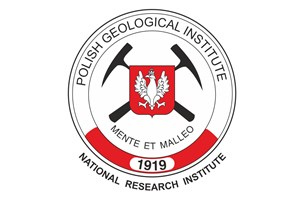
The Polish Geological Institute – National Research Institute, founded in 1919, is the largest R&D institute in Polish geology.
PGI-NRI coordinated the National Programme "Assessment of formations and structures suitable for safe CO2 geological storage including monitoring plans" (2008-2012/2013; Ministry of Environment) where over 60 PGI employees have been involved in various tasks and other five Polish partners were involved (AGH, CMI, O&GI, MEERI PAS, PBG - in total about two hundred people). The programme was to provide information necessary for future permits on exploration of CO2 storage sites all over the country and characterize selected storage sites using archive data and laboratory analyzes on drill core samples. Another project (O&GI, PGI-NRI; Ministry of Environment) was devoted to techno-economic aspects of CO2-EOR and CO-EGR in Poland. PGI has provided expertise to the first Polish demo project Bełchatów (a dozen people involved in total) and other CCS projects which have been planned as well (e.g. the planned new CCS-ready power blocks), leading prefeasibility studies on CO2 storage and transport for power companies and elaborating relevant EEPR and NER300 applications (including the formerly planned CCS demo project of PKE&ZAK in Kędzierzyn). We have been involved in several studies on pilot CO2 injection (sandstone Jurassic aquifer), where for the final location (in central Poland) a research/injection permit was granted by Ministry of Environment and research infrastructure was planned to be constructed within PGI facility (wells, monitoring infrastructure) but now another initiative on pilot injection project located in the vicinity of TAURON pilot capture facilities in southern Poland is planned. Now, modelling and laboratory studies on CO2 injection into gas bearing shales (Norway grants) as well as paleoenvironmental and paleoclimatic studies on correlation of regional caprock formations (Ministry of Science and Higher Education) are being conducted. FP7 projects: CGS Europe, ECCSEL PP & PP2
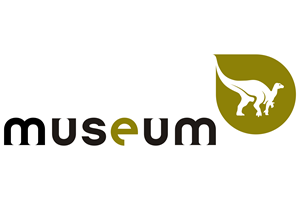
The Geological Survey of Belgium, department of the Royal Belgian Institute of Natural Sciences, is a geo-scientific documentation centre and is a central player in national and international research and development projects.
Information and materials dealing with the subsoil can be consulted here. In order to do this, modern and historical data that become available through research and exploration, are digitally processed in databases and geographical information systems. On request, this information is processed into specific end-user products or advice. Various scientific disciplines are necessary to do this, e.g. cartography, sedimentology, mineralogy, stratigraphy, geophysics and building materials. As a part of our service providing mission, also basic social issues are dealt with, like how to use and process the subsoil in a sustainable way, and how to cope with problems caused by inappropriate use. Special attention goes to urban geology, water resources, climate change, mineral resources, environment and geo-hazards. Geology is a part of experiencing nature. That is why the development of geoparks and geosites is stimulated.
The GeoEnergy group of the Geological Survey of Belgium originated with the exploration campaigns for coal in the Flanders and the Walloon region. The expertise was extended with projects including exploration for hydrocarbons, geothermal energy, heat-cold storage, subsoil gasification of coal, storage of natural gas and reutilising mining infrastructure. From 2000 on, research is performed on the possibilities of geological storage of CO2 for national and international projects. This includes coordination of the PSS-CCS projects (Policy Support System for Carbon Capture and Storage), which are the national umbrella projects on CCS in Belgium.
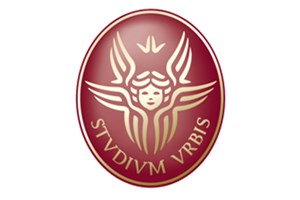
Sapienza University of Rome is one of the founding members of CO2GeoNet, with a central role in the areas of gas migration mechanisms and communication of research outcomes.
The Sapienza Universityis an internationally recognised centre of excellence for education and cutting edge research. It combines its 700-year scientific tradition with a constant commitment to innovation and the spreading of knowledge. Eleven faculties coordinate over 65 departments, 59 libraries and 21 museums, serving more than 115.000 students.
It is represented in the network by the Tectonic and Fluid Geochemistry Laboratory, based at the Earth Science Department and member of the CERI Research Centre for Geological Risks. The laboratory is specialised in near-surface gas and water geochemistry since 1980, social aspects of scientific research since 2000, and structural geology since 2006, with applications focussed on CCS research over the last 10 years. In the laboratory, researchers from the fields of geology, engineering and social science work together. The wide knowledge base and expertise within the group allows for an integrated scientific research approach, which comprises soil gas studies and structural geology studies, the engineering of innovative monitoring sensors and prototypes, and the development of tools and channels for the communication with stakeholders and the public.
Research conducted in the Sapienza Tectonics and Fluid Geochemistry Lab during more than 30 years of its existence, has addressed a wide range of topics related to, for example, natural hazards (faults, earthquakes, volcanoes), environmental impact (groundwater contamination), and resource exploration (oil and gas, geothermal, minerals), as well as studies examining the safety of storing nuclear waste or CO2 gas in the deep geological sub-surface.
Research Topics and Activities
Natural Field Labs - The Tectonics and Fluid Geochemistry Lab team has developed the concept of the natural field laboratory, as a main tool for developing research activities applied to geological storage. Natural field laboratories are sites where naturally produced CO2 is leaking at the ground surface, both onshore and offshore. These sites can be properly equipped to allow researchers from different fields and countries work together in an open air laboratory.
The studies in these natural conditions allow to:
- to better understand gas migration mechanisms in the geological environment (e.g. along faults and fracture networks);
- to test a wide range of monitoring techniques that have been proposed for use at CCS sites (e.g. soil gas, gas flux, open path lasers, remote sensing, shallow geophysics, etc.);
- to examine the possible impacts of a CO2 leak on the ecosystem and on groundwater quality.
The most important natural field labs where the group has developed its activities are the Latera caldera (photo above), the San Vittorino valley, and Panarea Island.
Near surface gas geochemistry:
1) discontinuous monitoring - The Tectonics and Fluid Geochemistry Lab is one of the most experienced European research group in this field, having used soil gas geochemistry and gas flux methods since the early 1980’s as a tool for environmental, resource exploration and risk assessment studies. A large database covering the whole National territory, with more than 40.000 gas samples, has been collected in the last 20 years.
Much of the work has been focussed on using natural field laboratories to better understand gas migration processes, to improve methodologies and to test new ones, as laser systems for atmospheric monitoring and gas sensing probes for continuous monitoring. This group has also conducted extensive research on CCS industrial sites such as In Salah (Algeria), Sulcis (Sardinia), and 5 years of monitoring at Weyburn (Canada).
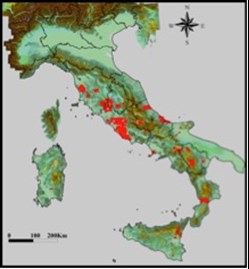
Areas sampled by the Tectonics and Fluid Geochemistry Lab during the last 20 years
A particular scenario for gas monitoring are populated areas with natural release of CO2 and other gases of deep origin like Radon, such as the city of Ciampino on the southern edge of Rome and the Latera caldera. In these areas soil gas and aqueous geochemical surveys were performed, as well as gas measurements in private homes. GIS models were developed, indicating zones of elevated risk, and activities with the general public to improve local understanding and safety. These activities are still ongoing, and new sampling strategies are developing, with the aims to combine continuous and discontinuous monitoring, to cover the spatial and temporal scale of observation. Moreover, research focus at the moment is on baseline studies and how a potential leakage anomaly can be separated from background near-surface biological “noise”, as well as improved monitoring strategies, tool development, and data interpretation.
2) Continuous monitoring: CO2GasPro monitoring station.
The team of the Tectonics and Fluid Geochemistry Lab has developed, constructed, and deployed a number of autonomous stations for the continuous monitoring of both CO2 and CH4 concentrations in air (that is, in the unsaturated soil horizon or on ground surface) and CO2 concentration in water (in groundwater wells or in surface water bodies). The system can be configured for either real-time data access via an Internet-based server or with an internal memory for intermittent data download where continual data transfer is difficult (e.g. the deep ocean).
Groundwater and surface water geochemistry.
The Tectonics and Fluid Geochemistry Lab has over 30 years of experience in aqueous geochemistry studies as applied to a wide variety of geological studies, and has laboratory capability for the analysis of major and trace elements and dissolved gases. Studies related to CCS include: examining the impact of natural CO2 seepage on the quality of shallow groundwater within the San Vittorino valley and of surface seawater near Panarea Island; studying dissolved gas distributions and processes in surface water at gas-leaking natural sites (Panarea Island, Black Sea) and at proposed industrial storage sites (Adriatic Sea); and testing long-term monitoring methods for groundwater tracers in shallow wells as related to seismic activity and sinkhole development within the city of Camaiore.
Fracture modelling and fault characterization
From 2006 the Tectonics and Fluid Geochemistry Lab team includes the contribution of structural geologists. This has allowed the group to enrich its research, integrating the study of soil gas migration with fracture modelling, fault zone characterization, geological modelling and seismic interpretation. All these aspects cover a fundamental role in the site characterization phase of geological storage. In particular, the occurrence of faults in the overburden and within the reservoir requires dedicated studies to support the development of appropriate risk assessment and monitoring strategies. Research is being developed to coupled fault zone geometry and potential leakage. The group is also engaged in fracture modelling, which is an important step to assess the capacity of a potential CO2 storage reservoir, using a field analogue approach, developed in collaboration with Schlumberger.
Study of CO2 storage perception and communication.
Since the year 2000 the Tectonics and Fluid Geochemistry Lab has started to explore the challenges of geological studies’ dissemination. Psychological studies have been undertaken to understand how to communicate the research outcomes to stakeholders and the public. In the context of CO2GeoNet the group has become a leader for Spreading of Excellence activities, coordinating the partners and promoting the integration of multidisciplinary research in the field of CO2 storage and its user friendly communication. Growingly has emerged the importance of interaction of the researchers with the wider societal context, to better address in their work what is of interest and concern to society. This has led the members of the lab to further develop tools for communicating science, as for instance lay reports and videos, and research experiences of direct sharing with stakeholders, the media and the public, as in the FP7 R&Dialogue project. A new phase of this work is going to take place in the context of the Horizon 2020 project ENOS. Research will be dedicated to explore how the collaboration of researchers with members of the public and of the local community, can help the development of satisfactory standards for all, in the best practice guidelines for the geological storage of CO2.
CCS European Community Projects
Our portfolio of EC funded projects on CCS includes in the Sixth Framework Programme: Nascent, CO2ReMoVe, MovECBM, CO2GeoNet. In the Seventh Framework Programme: RISCS, ECO2, SiteChar, CGS Europe and R&Dialogue.

SPR is a fully consolidated subsidiary of the SINTEF Group. The institute is organised as six departments:Basin modelling, Seismics, Formation physics, Drilling and well technology, Multiphase flow laboratory and Reservoir technology.
Professionals are specialized in areas as physics, geophysics, geology, petroleum engineering, chemistry, fluid mechanics, mechanical engineering, electronics and cybernetics. There is a close collaboration between SPR and the other institutes within the SINTEF Group and several universities, predominantly NTNU.
Since 1987 the institute has accomplished close to 40 CO2 related projects within process technology, concepts for reduction of CO2 emissions and CO2 based EOR and aquifer storage of CO2. The institute had a prominent position within the SACS project within the field of reservoir modelling, reservoir simulation and seismic monitoring. Presently SPR are involved in a five year competence project with user involvement (2002-2006) with overall objectives to develop a methodology to determine the optimal strategy for CO2 injection in oil reservoirs and to develop a methodology to determine the storage capacity, residence time and relevant safety aspects related to CO2 storage in aquifers in a given region. Both main activities also include seismic monitoring of injected CO2. The institute is also involved in CO2-store, CCP as well as several industry projects addressing CO2-EOR.
SPR performs integrated reservoir studies that includes building of reservoir models based on available seismic, geological, well, fluid and core data, reservoir simulations for various production scenarios, identification of optimal development schemes and preparation of well and drilling plans. The institute has a complete infrastructure for integrated reservoir studies including reservoir technology and formation physics laboratories, necessary software and computer installations.

Netherlands Organisation for Applied Scientific Research (TNO) is the largest fully independent Research, Development and Consultancy organisation in the Netherlands with a staff of about 5,400 and a total annual turnover of about 515 million Euros.
TNO its primary tasks are to support and assist trade and industry including SME’s, governments and others in technological innovation and in solving problems by rendering services and transferring knowledge and expertise. TNO has been and is participating in many EU programmes aiming at technological development. TNO performs its widely ranging activities in 15 independent institutes. TNO will be involved in the proposed work by “The Netherlands Institute of Applied Geosience - TNO National Geological Survey”, which is the central institute for geoscientific information and research in the Netherlands, working for the sustainable management and use of the subsurface and the natural resources found there. The applied geoscientific and associated technology research as well as the complex geo-advisory carried out by the institute fits with the geoscientific and technological components that are carried out by governments and business, both national and international. The institute has a long history of CO2 storage research starting more than 10 years ago with a few researchers to now at a big scale with 10-20 researchers involved in various aspects the field of CO2 sequestration. These aspects include geoscience on CO2 fluid flow in reservoirs and aquifers, geochemical and geomechanical subsurface process modelling and seismic monitoring, biogeological and hydrogeological surface process modelling and monitoring. It also includes strategy studies and health safety and environmental studies applying the geoscientific knowledge developed.
The institute closely operates with “TNO Environment, Energy and Process Innovation (TNO-MEP)” is an expert centre and contract research institute for industry and government in the field of sustainable development and environmentally oriented process innovation. This institute has also been involved in development of CO2-capture technology and related consultancy since the early nineties. TNO-NITG has been very activly involved in the creation of several relevant European networks: ENeRG, Eurogeosurveys and CO2NET. TNO will act on behalf of the Netherland’s Research School on Solid Geo-science, comprised by the University of Utrech, Fries University of Amsterdam and the Technical University of Delft.

The Institute of Geology at Tallinn University of Technology (Tallinna Tehnikaülikooli Geoloogia Instituut, TTUGI, http://www.gi.ee; formerly an institute of the Estonian Academy of Sciences) is leading institution in the field of geosciences in Estonia and one of the largest in the Baltic region.
TTUGI is known by high level scientific publications. 150 articles listed in ISI-Web of Science were published and 6 PhD theses were defended in the institute during 2013-2015. TTUGI is a pioneer institution in Estonia in CO2 storage research and education, providing academic CO2 geological storage course to international students. Since 2004. IGTUT represents Estonia in the European Network for Research in Geoenergy (ENeRG), held its presidency in 2007, and manages its internet site in 2008-2011 (http://www.energnet.eu/) and GEO ENeRGY Newsletter since 2012.
TTTUGI cooperates with CO2Geonet since 2005 and became its member in 2014. TTTUGI is an active member of the BASRECCS Network launched in 2014. TTUGI participated in EU FP6-FP7 and EC projects (EU GeoCapacity, CO2NetEAST, CGS Europe and CO2Stop), made research and provides regular consultations to major national energy company Eesti Energia and to Ministry of Environment of Estonia. TTUGI was the only partner from the Baltic region in the CO2NetEast project being responsible for the cooperation and information dissemination in the entire Baltic Region. TTUGI is advising in the field of CO2 geological storage (CGS) to industrial companies and ministries of environment of the Baltic region, policy makers and scientists and disseminating information in the field of CCS using CCS technology portal in Estonian (http://www.gi.ee/CO2net-east/) and Russian (http://www.gi.ee/CO2net-east/r). TTUGI is an author of the English-Estonian and English-Russian glossaries of CCS terms posted at the corresponding websites and the organiser of a number of international conferences, workshops and geological excursions.
The main areas of expertise are 3D geological, geochemical, petrophysical and geophysical modelling, reservoir and cap rock properties, CO2 storage capacity, monitoring and seismic modelling of CO2 plume in the Baltic Sea Region, EU CCS Legislation and CCS education.

University of Zagreb - Faculty of Mining, Geology and Petroleum Engineering (UNIZG-RGNF). The Faculty is a part of the University of Zagreb and consists of several institutes that are jointly teaching four studies – Mining Engineering, Geology, Geological Engineering and Petroleum Engineering.
There are also PhD programmes in respective fields. Staff consists of 56 professors, 28 assistants and 27 other teaching collaborators. Apart from the primary activity in high education, they are usually engaged both in exploration and research activities funded by the government (20 active projects started in 2007 funded by the Croatian Ministry for Science, Education and Sport) and in various expert tasks for other investors. This research covers a wide range of activities related either to mining (blasting, soil and rock mechanics, mine completion, open pit exploitation etc.), geology (geological mapping, structure geology, petroleum geology, engineering geology, hydrogeology, geophysical prospecting, deposits of mineral raw materials etc.) or to petroleum engineering (drilling techniques, well fluids, reservoir development, management of HC reserves, production of HC’s and geothermal water, gas management, safety techniques and protection of environment).
Faculty is the CCS R&D leader in Croatia, the country representative in ENeRG (informal organisation – European Network for Research in Geo-Energy), has participated in the two ongoing FP6 projects: EU GeoCapacity (STREP) and CO2NetEAST (CA). In EU GeoCapacity, the main activities included mapping of the regional CO2 storage potential in various types of sinks (covering both the territory of the Republic of Croatia and of the neighbouring Bosnia and Herzegovina), and, as a part of the activity, coordinating the investigations done in the Southern group of countries (Bosnia-Croatia-Slovenia-Italy-Spain) in terms of joint methodology and cross-border correlation. In the coordinated action CO2NET EAST, the faculty has promoted the dissemination of the CCS-related research and knowledge in Croatia and neighbouring countries. In FP7 the faculty participates in the integrated project ECCO, mainly in transferring the Croatian experience in on-shore CO2 injection pilot project.